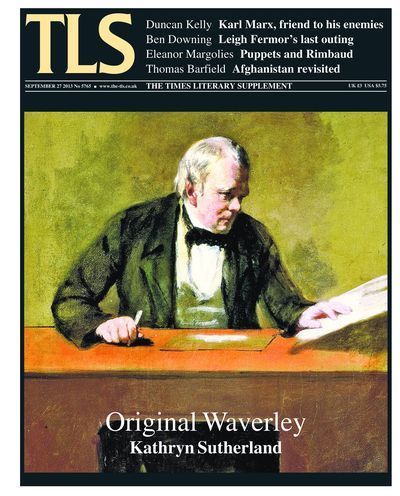In this week’s TLS – a note from the Managing Editor
Few writers have been so deeply involved in the business of writing as Sir
Walter Scott. Described by Thomas Carlyle as “a Novel Manufactory”, Scott
oversaw a production line employing many hands – amanuenses, house readers,
compositors, and his business partner, James Ballantyne – not to mention the
fictitious “pseudonymous editor-historians” in the novels, and his own later
re-editing of his “grande opus”. This makes the task of reconstructing an
“authentic” version of the Waverley novels a challenging one: Kathryn
Sutherland respects the diligent case-by-case negotiations evident in the
new Edinburgh Edition.
Scott, Sutherland writes, “invented the historical novel in its modern form”.
History creates its own fictions and dramas as it evolves. Thomas
Barfield reviews a number of recent books on Afghanistan, and notes that
a focus on leading figures or dramatic turning points (occupation, surge,
withdrawal) sometimes obscures a messier truth: a world of many actors with
diverse motives, also in need of delicate case-by-case negotiation. Stephen
Lovell reviews 1990, which examines Russian society in a year of
transition, but wonders if that year was a genuine turning point, or just a
useful snapshot from a longer, more awkward transition.
Decades earlier, Russia had withdrawn from Austria, leaving “a symbolic cache
of arms and tanks” as a gift and covert threat. The Austrians reciprocated
by giving the Russians a report from the 1850s made by one of the Austrian
spies who had been monitoring the exiled Karl Marx. As Duncan Kelly points
out, reviewing a new biography of Marx, the fervent Communist was, for some
of the time, an unwitting puppet of his enemies in Vienna.
In Commentary this week, Eleanor
Margolies investigates an intriguing link between real puppetry and Arthur
Rimbaud. Charleville-Mézières, Rimbaud’s hometown, is home to the
world’s largest puppet festival, as well as the Institut International de la
Marionnette; but the connections, Margolies argues, go much deeper than
that.
Robert Potts
Peter Stothard's Blog
- Peter Stothard's profile
- 30 followers




